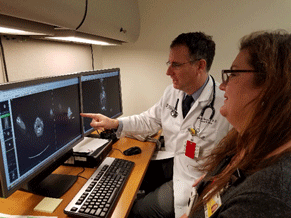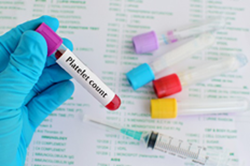Cancer Clinical Trials

Today's standard of care was yesterday's clinical trial. Consider clinical research.
University of Maryland St. Joseph Medical Center's (UM SJMC) Cancer Institute is an active partner in advancing the understanding and treatment of cancer through clinical trials and research studies of people who have cancer. The goal of these studies is to find better ways to treat, diagnose and prevent cancer so that people can live better and longer.
Clinical trials are the engine of cancer research and can represent a patient's best chance for effective therapy. The clinical trials offered at UM St. Joseph Medical Center include preventive, treatment and observational research studies. They are based on nationally approved standards of cancer care and are designed to research how we can best improve our patients' cancer outcomes.
Patients have access to national, investigator-initiated and industry-sponsored clinical trials. The UM SJMC research team can help determine if a treatment option is right for a particular patient. As with all clinical trials, patients who enroll must meet specific criteria. Clinical trials currently in process at UM SJMC's Cancer Institute are below.
For Any Type of Cancer (for any patient who has received one or more IO therapeutics and experiences one or more serious adverse immune-related event)
-
A151804 – Establishment of a National Biorepository to Advance Studies of Immune-Related Adverse Events (NCT04242095) – This trial collects research data and samples from patients who experience immunotherapy side effects to store for use in future research studies. Studying research data and samples from patients who experience immunotherapy side effects may help researchers better understand how to predict, prevent and treat these side effects. This study establishes a national biorepository including biospecimen and clinical data collections from patients treated with immuno-oncology (IO) therapeutics who experience one or more serious (grade 3-4) immune-related adverse events (irAEs), rare infections or hyperprogression (acceleration of tumor growth). Patients will undergo collection of tissue and blood samples at the time of registration (within 72 hours of confirmation of one or more severe irAEs) and at 1 month after registration.
Early Cancer Detection (available to patients with and without cancer)
- A212102 – Collecting Blood Samples From Patients With and Without Cancer to Evaluate Tests for Early Cancer Detection – A study designed to help researchers evaluate and develop tests for early cancer detection. Blood and tissue samples will be collected from patients with cancer and without cancer.
Advanced Cancers
- A222004 – Olanzapine Versus Megestrol Acetate for the Treatment of Loss of Appetite Among Advanced Cancer Patients – A randomized Phase III trial to compare olanzapine to megestrol acetate as an appetite stimulant in cancer patients who are suffering from loss of appetite
Breast Cancer
- NSABP B-64/EXActDNA-003 – Study of Molecular Residual Disease Detection in Breast Cancer (MRD) – This is a prospective, multicenter study of participants who will undergo neoadjuvant treatment for cT2-T4, high-risk, early breast cancer (EBC), who are willing to provide formalin fixed paraffin embedded (FFPE) tissue and serial whole blood specimens for circulating tumor DNA (ctDNA) analysis via Oncodetect. There will be two parts of the study (Part 1 and Part 2), with the goal to enroll up to 1800 participants. The planned maximum duration of participant participation is up to five and half years from enrollment to study completion. Part 1 of the study will assess the feasibility of utilizing available residual FFPE tissue from diagnostic core biopsy specimens for creation of participant-specific bespoke ctDNA assays. Feasibility will be defined by receipt of evaluable FFPE tissue from diagnostic biopsies for creation of bespoke ctDNA assays in > 60% of participants, which will allow for Part 2 of the study. The rate of submission of evaluable tissue will be monitored on a continuing basis with formal analysis occurring when 500 participants across all subtypes are enrolled. Unless the rate of evaluable tissue submission is determined to be ≤ 60%, enrollment will continue without interruption in Part 2 up to 1800 participants (inclusive of Part 1). The enrollment of each breast cancer subtype will be continually monitored, and individual breast cancer subtypes may be closed to further accrual while enrollment in other subtypes continues. The primary analysis of the Oncodetect for each of the breast cancer subtypes will be conducted when 28 confirmed cases of distant recurrence as a first event are observed in each subtype.
- A191901 – Optimizing Endocrine Therapy Through Motivational Interviewing and Text Interventions – This study may help determine if using supportive text message reminders and/or telephone-based counseling can help encourage women to take their endocrine therapy medication as prescribed. Good medication adherence—or how well patients take the medication as directed by their doctors—may contribute to better health outcomes. Poor medication adherence has been shown to be a serious barrier to effective treatment for hormone receptor-positive breast cancer patients.
-
Tailor RT Study – Regional Radiotherapy in Biomarker Low-Risk Node Positive and T3N0 Breast Cancer – The purpose of this study is to compare the effects on low-risk breast cancer receiving usual care that includes regional radiation therapy, with receiving no regional radiation therapy. Researchers want to see if not giving this type of radiation treatment works as well at preventing breast cancer from coming back.
-
S2010 – A Randomized Phase III Trial Comparing Active Symptom Monitoring Plus Patient Education Versus Patient Education Alone to Improve Persistence with Endocrine Therapy in Young Women with Stage I-III Breast Cancer (ASPEN) – This Phase III trial compares the effect of active symptom monitoring and patient education to patient education alone in helping young women with stage I-III breast cancer stay on their hormone therapy medicines. The patient education tool contains interactive weblinks which provide patients with education material about breast cancer and side effects of therapy. Symptom monitoring is a web link via email or text message with questions asking about symptoms. Hormone therapy for breast cancer can cause side effects, and may cause some women to stop treatment early. Asking about symptoms more often may help women keep taking hormone therapy medicines.
Colorectal Cancer
Lung Cancer
-
S1914 – A Randomized Phase III Trial of Induction / Consolidation Atezolizumab (NSC #783608) + SBRT Versus SBRT Alone in High Risk, Early State Non Small Cell Lung Cancer (NSCLC) – This study compares treatment with eight cycles of Atezolizumab plus Stereotactic Body Radiation Therapy (SBRT) to SBRT alone in patients with high risk, early-stage NSCLC inoperable disease or where the patient is unwilling to undergo surgery.

Studies Currently in Active Follow-up
Please note: These studies are currently full and in active follow-up at UM St. Joseph. At this time, we are actively tracking study participants' progress and using what we learn to offer even safer, more effective and advanced treatment options for our patients.
Breast Cancer
- A011202 – Comparison of Axillary Lymph Node Dissection With Axillary Radiation for Patients With Node-Positive Breast Cancer Treated With Chemotherapy – A randomized phase III trial comparing axillary lymph node dissection to axillary radiation in breast cancer patients (CTI-3 N1) who have positive sentinel lymph node disease after neoadjuvant chemotherapy
- NSABP B-59 – Clinical Trial of Neoadjuvant Chemotherapy with Atezolizumab or Placebo in Patients with Triple-Negative Breast Cancer Followed after Surgery by Atezolizumab or Placebo – Patients in this study have a type of breast cancer called "triple-negative" and have not had any treatment or surgery to remove the cancer. Triple-negative means that your tumor is negative for the protein HER2 and is not sensitive to hormone treatment. This study may help determine if administering the experimental drug atezolizumab with chemotherapy, given before surgery (neoadjuvant therapy) for breast cancer, is better than administering a placebo with the chemotherapy.
- B-61 – A Phase III, Randomized, Open-Label, Multi-Center Study Evaluating the Efficacy and Safety of Adjuvant Giredestrant Compared with Physician's Choice of Adjuvant Endocrine Monotherapy in Patients with Estrogen Receptor-Positive, HER2-Negative Early Breast Cancer – Endocrine therapy with tamoxifen or aromatase inhibitors (AIs [with or without ovarian function suppression (OFS)]) are currently the main endocrine treatment options for estrogen receptor-positive (ER+) early breast cancer (EBC). Despite the effectiveness of available therapies, many patients ultimately experience disease relapse or develop resistance to these agents. In addition, treatment-associated toxicity is an important major barrier to the full application of the current cancer treatment leading to treatment discontinuation in many patients. Consequently, there is a critical need for more optimal adjuvant therapy in patients with ER+ EBC, particularly for patients who have a high likelihood of recurrence.
-
S-1207 – Hormone Therapy With or Without Everolimus in Treating Patients with Breast Cancer – The current standard treatment after chemotherapy is hormone treatment alone. This study may help determine whether treatment with everolimus plus hormone treatment after chemotherapy will keep patients cancer-free for longer. Everolimus is a drug approved for the treatment of patients with advanced or metastatic (or spreading) kidney or breast cancer.
-
S-1418 – Testing MK-3475 (Pembrolizumab) as Adjuvant Therapy for Triple Receptor-Negative Breast Cancer – The purpose of this study is to compare the usual approach (no more treatment or additional chemotherapy and radiation therapy after surgery or radiation therapy alone after surgery), with any effects (good or bad) of receiving one year of therapy with the experimental drug MK-3475 (also called pembrolizumab) after surgery. This study will allow the researchers to better understand whether treatment with pembrolizumab is better, the same or worse than the usual approach alone.
- A221803 – Mepitel Study: Randomized Phase III Trial with Mepitel Film for the Prophylaxis of Radiation Dermatitis in Breast Cancer Patients – Breast cancer patients undergoing adjuvant radiotherapy commonly experience radiation-induced skin reactions which adversely impact quality of life. Importantly, patients receiving chest wall radiation or patients with large breasts are more likely to have worse skin reactions. In the last decade, there have been no significant advances in preventing or treating radiation-induced skin toxicities. In response to the lack of evidence, Sunnybrook investigators previously conducted a pilot study (REB #294-2018) of Mepitel Film and preliminary results showed improvements in high-grade skin reactions. Mepitel Film has not been widely adopted in North America as more evidence is needed. The validate the efficacy of the film compared to the standard of care, a study testing the efficacy of the film is proposed. In the study, 216 patients will be randomized (2:1) to receive either the film or the institution's current skin treatments and all patients will have their skin assessed.
Lymphoma
- RELEVANCE –Combined Rituximab and Lenalidomide Treatment for Untreated Patients with Follicular Lymphoma – Patients in this study have been diagnosed with follicular lymphoma (FL), which is a cancer of lymphocytes, a type of white blood cell. Recent studies suggest that rituximab plus chemotherapy followed by rituximab maintenance therapy is becoming a new standard of care for FL patients. This study involves the need to look for new treatments that may reduce the risk for recurrence or to prolong the disease-free time frame.
For more information about clinical trials at UM St. Joseph Medical Center and to learn more about how we can help patients access these important medical studies, please call our Office of Clinical Research at 410-427-5459.
